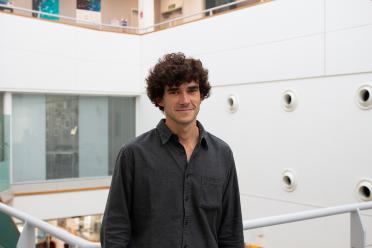Dr Wojtowicz is currently based in the Macaulay Group at the Earlham Institute and Dr Garrido-Oter will join from the Max Planck Institute for Plant Breeding Research in Germany. They will both take up the posts in early 2023.
Professor Neil Hall, Director of the Earlham Institute, said: “We’re delighted to be able to support Edyta and Ruben in establishing groups at the Earlham Institute. It’s fantastic for us to see future leaders in their field coming both from within the Institute and internationally-recognised organisations overseas.”
Dr Edyta Wojtowicz is a molecular haematologist with a particular interest in platelet biology. As a Sir Henry Wellcome Postdoctoral Fellow in Dr Iain Macaulay’s Group, she has been working to improve the understanding of platelet production in health and disease.
After completing an MSc in Medical Biotechnology at the Jagiellonian University in Krakow, Dr Wojtowicz studied for a PhD in Molecular Medicine at the University Medical Centre, Rijksuniversiteit Groningen, as a Marie Curie Early Stage Researcher. During her PhD, she worked with Professor Gerald de Haan and Dr Leonid Bystrykh on cellular and molecular characterisation of the miR-125 family in normal and malignant haematopoiesis.
Subsequently, she was a Barncancerfonden Postdoctoral Fellow working with Professor Sten Eirik Jacobsen at the Karolinska Institute, performing quantitative clonal studies of perturbed and unperturbed haematopoiesis using new methods to quantitatively study kinetic changes in clonal contribution of haematopoietic stem cells.
Dr Wojtowicz said: “I’m excited to take up this opportunity. The Earlham Institute has been the ideal environment to move my research forward and it’s fantastic to be able to build on those existing links as I establish my group.
“My group will be studying the impact of dietary intervention on hematopoietic and immune system function in health and disease. In particular, I want to investigate how molecular, metabolic and microbiome changes can shape the fitness of both systems. My research interests synergise with both the Institute’s and Park’s focus on technology development, large omics data integration and microbiome studies.”
Dr Garrido-Oter currently leads the Integrative Bioinformatics group at the Max Planck Institute for Plant Breeding Research in Germany. The group is developing and employing computational tools and reductionist experimental systems to understand the evolutionary and ecological principles that govern the structure and dynamics of complex microbial communities.
He studied computer sciences at the Technical University of Berlin before joining the Max Planck Institute in 2012. His research has focused on identifying the principles that govern microbiota establishment, stability and dynamics, along with how adaptation occurs in a community context.
Dr Garrido-Oter said: “I’m really pleased to be joining the Earlham Institute. The infrastructure, technology, and active community of plant and microbial scientists make this an ideal place for me to continue my work.
“I’ll be exploring the inner workings of microbial communities. I’m particularly interested in those that associate with photosynthetic organisms, such as land plants and terrestrial microalgae, which complements the research interests of scientists both at the Earlham Institute and also across the Norwich Research Park.”


